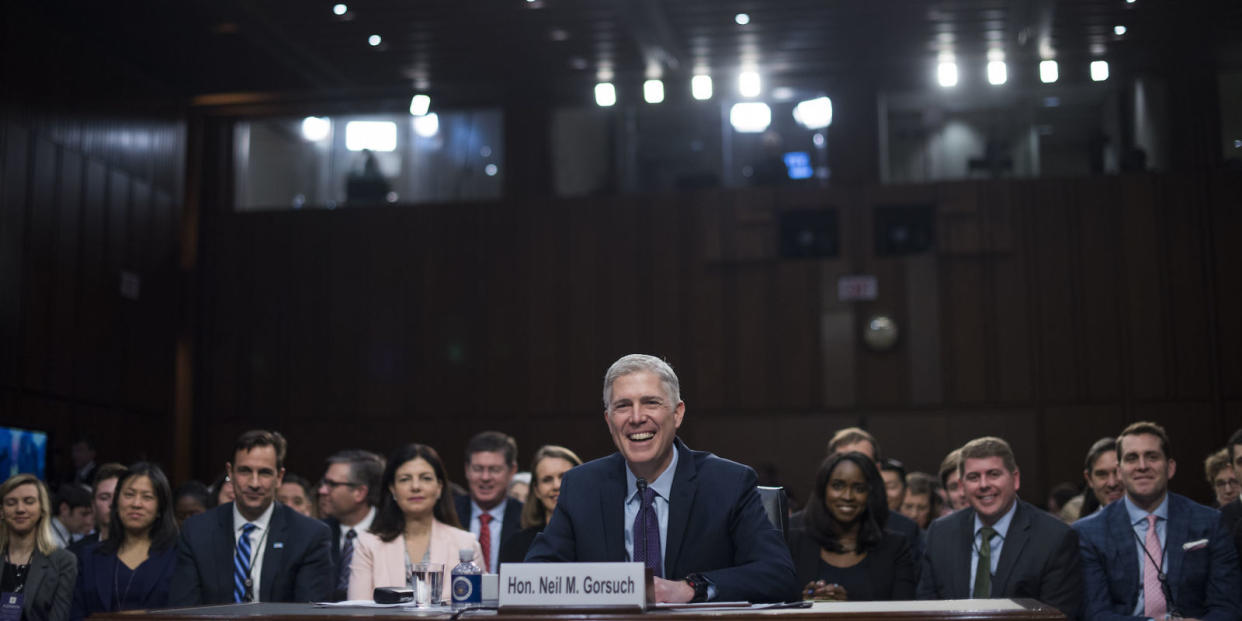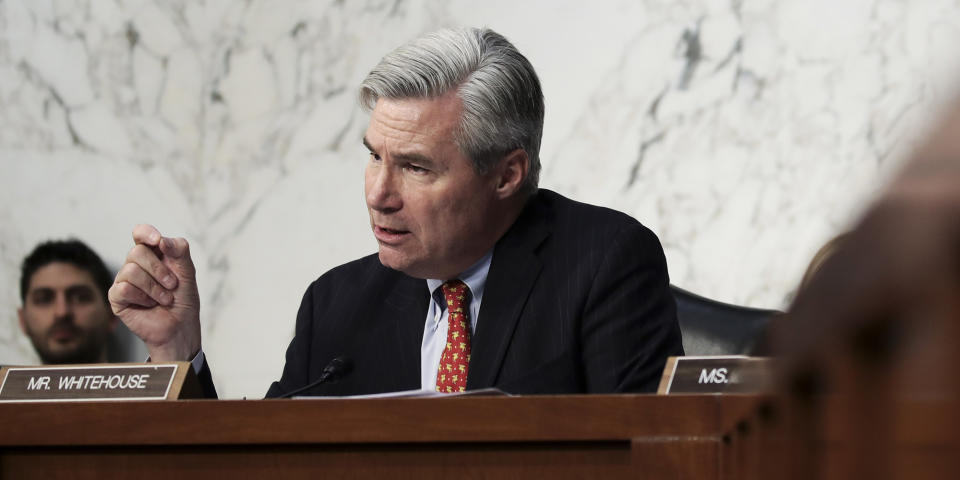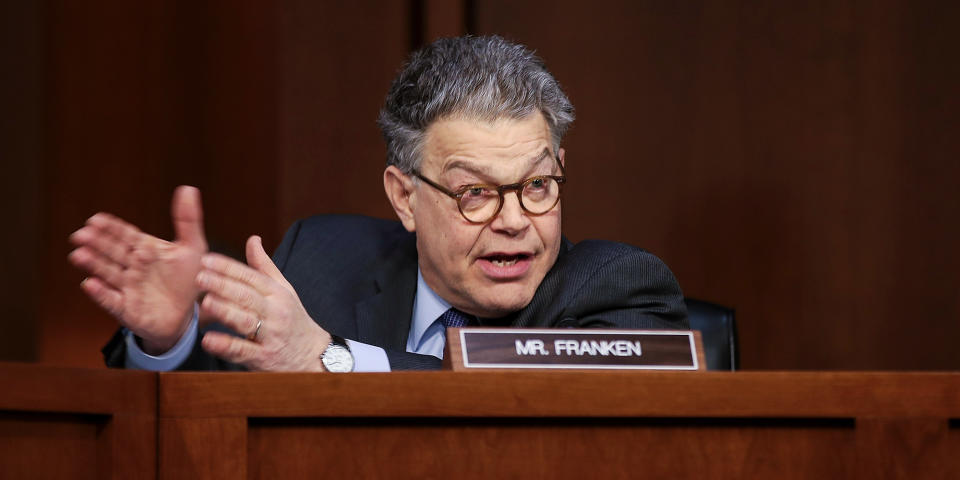Neil Gorsuch Knows What Dark Money Is, and What That Money Expects of Him

WASHINGTON-Senator Sheldon Whitehouse, Democrat of Rhode Island, had had it up to his eyeballs. He had sat in the Senate Judiciary Committee and listened to Neil Gorsuch, a nominee for the Supreme Court, fielding juvenile questions from his Republican colleagues, most of which centered on pieces of pet legislation-Lindsey Graham's bogus "fetal pain" bill, John Cornyn's worries about religion in the public square-and the essential question of, "Tell us why you're an awesome judge."
(That started on Monday, by the way, when Nebraska's Ben Sasse presented what amounted to a middle-school civics project by way of introducing himself to the nominee.)
Whitehouse also had sat through Gorsuch's folksy-is-as-folksy-does flummery about how a nun had paddled him into being able to read, how ol' Whizzer White had skated through his hearing in 90 minutes, fueled only by unfiltered Camels, and how Gorsuch had "taken a little jog" down to the Lincoln Memorial before meeting the committee in order to Think Big Thoughts. (He got a bit flummoxed between the Gettysburg Address and the Second Inaugural.) He also had sat through Gorsuch's endless pieties about how he was as apolitical as the morning dew, and that was about where Sheldon Whitehouse had stood all he could and he couldn't stand no more.
He was done with the preposterous notion that the political act of nominating judges should contain no politics. And he had a precise example to share.
There's been a lot of talk about how this is outside of politics and how we're above politics but there is a group planning to spend $10 million in which their own press release describes as a comprehensive campaign of paid advertising, earned media, research, grassroots activity, and a coalition enterprise all adding up to the most robust operation in the history of confirmation battles.
Gorsuch, of course, for all his academic achievements and professional accomplishments, is also a product of the conservative movement and the hundreds of luxurious ideological terrariums from which they produce congresscritters, professional pundits and, yes, federal judges. (His ties to longtime wingnut sugar daddy Philip Anschutz are a matter of public record.) And there is a sophisticated and purely political campaign currently underway outside the rarefied air of a Senate committee room. (The sidewalks outside of the Hart Building were thick on Tuesday morning with fresh-faced young people waving very well-produced signs.)
Whitehouse had him there and, through his questioning, managed to make Gorsuch look ridiculous on the matter of money in politics. Whitehouse kept hammering at Gorsuch about whether Gorsuch thought the anonymous benefactors who are shoveling dark money into his confirmation fight should be identified. Gorsuch kept trying to throw it back on Congress. If Congress wanted this kind of transparency, he argued, it should pass a law requiring it.
(Here is where we pause to note that this argument in relationship to the Citizens United decision is fundamentally moot. As written, Citizens United pretty much preemptively ruled any attempt to limit campaign money to be an unconstitutional restriction of free speech. It also was used almost immediately to demolish state laws on campaign finance. The only real solution to Citizens United in a constitutional amendment to overturn it, but Gorsuch knows that's an almost impossible standard to meet.)

Whitehouse was having none of it. He pointed out that many of the same people funding the political operation in support of Gorsuch's nomination also were behind a $7 million drive to deny Merrick Garland even a hearing when he was nominated by former president Barack Obama. Whitehouse said:
What's interesting is that this group sees a difference between him [Garland] and you that I don't understand…now we have $10 million going the other way. That's a $17 million delta and for the life of me, I'm trying to figure out what they see in you that makes that $17 million worth the spending. Do you have any answer to that?
Gorsuch suggested that, if Whitehouse wanted to know who they were, he should ask them.
"I can't," Whitehouse said. "I don't know who they are. It's just a front group."
"I don't know who they are. It's just a front group."
For the first time all day, Gorsuch's aw-shucks, lemme-tell-you-about-Oxford demeanor cracked just a little. Whitehouse was calling into question the legitimacy of his nomination because it was produced by a political system the legitimacy of which has been undermined by a flood of uncontrolled anonymous money that was loosed by a series of decisions from the Court that Gorsuch has been nominated to join. This is a genuinely interesting area for exploration that Gorsuch had no intention of entering without a helmet and pads.
Senator, I have no information about anything you just described. I don't know about that.
This is not remotely believable. As Senator Al Franken pointed out later, when he read from e-mails dating back to Gorsuch's days as a high-level Republican lawyer, specifically about his work for the 2004 Bush re-election campaign, Gorsuch has been a political being for his entire adult life and, at the same time, he hasn't spent a second in elected office, so his politics were formed and were exercised almost entirely through the conservative Republican institutional infrastructure.
(Hell, when he was a kid, he was a Senate page. He's been in politics as long as Orrin Hatch.)
He knows what dark money is. He knows where it comes from. He knows the use to which it is put. And he knows what is expected of him when he is confirmed. (Which is not to say we know what he'll do when he's got the robe, although I know pretty well which way to bet.) For the country, it comes down to how much disbelief you're willing to suspend to judge what is produced by this ridiculous shadow play of a process.

Late in the afternoon, while discussing a fairly famous dissenting opinion Gorsuch had written in the case of Trans-Am v. Administration Review Board, United States Department of Labor, Franken had invoked something called the absurdity rule.
In the case, a truck driver named Alphonse Maddin discovered on the highway that the brakes on his trailer had frozen. He pulled off the side of the road and called for help, which never came. The heater in his cab failed, and Maddin soon began exhibiting the symptoms of hypothermia. His bosses told him to wait with his crippled trailer which, even if Maddin were capable of driving safely, which he wasn't, would have been a hazard to his fellow motorists because the frozen brakes on the trailer would have held his speed down to 15 miles per hour. The company fired Maddin. He sued, and won, but Gorsuch dissented.
Gorsuch knows what is expected of him when he is confirmed.
His dissent was based on the fact that Maddin had driven the vehicle. The driver had sued on the basis of an OSHA regulation that forbade the firing of anyone for refusing to operate an unsafe vehicle. Maddin had in fact "operated" the vehicle so, according to Gorsuch, his firing was justified because of the plain reading of the regulation. Franken asked him whether or not that "plain reading" violated the absurdity rule, an ancient concept that seeks to prevent the literal reading of the law from producing ludicrous results.
It is absurd to say that this company was within its rights to fire him because he made a choice not to-of possibly dying by freezing to death or causing other people to die because he was driving an unsafe vehicle. That's absurd. Now I had a career in identifying absurdity, and I know it when I see it.
So, I suspect, do we all.
Respond to this post on the Esquire Politics Facebook page.
You Might Also Like

